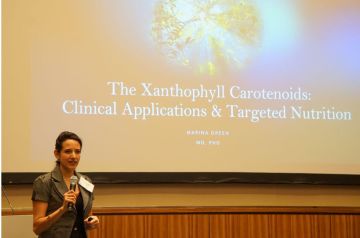Her talk emphasised the need to translate research in the area of micronutrients and bioactives into practice to optimize nutrition and wellbeing
Dr Marina Green MD, PhD, Health Sciences Research Lead and Deputy Director, Nutrition Research Centre Ireland (NRCI) at South East Technological University (SETU) was invited to present at Symposium 'Advancing nutrition science to meet evolving global health needs' organised by the Council for Responsible Nutrition – International (CRN – I). The symposium was held prior to the Codex Committee on Nutrition and Food for Special Dietary Uses (CCNFSDU), a subsidiary body of the Food and Agriculture Organisation of the United Nations, with the aim to provide science-based information to regulators, health care professionals and the media. World
World renown expert and opinion leader Dr Lynnette Neufeld, Director of Food and Nutrition Division at the Food and Agriculture of the United Nations (FAO) opened the symposium highlighting global health challenges and policy efforts. The symposium was led by key opinion leaders in public health, human health, and nutrition.
Clinical benefits
Dr Green talked about the targeted use of xanthophyll carotenoids, lutein, zeaxanthin, and meso-zeaxanthin, and their benefits for human health and function. Her talk emphasised the need to translate research in the area of micronutrients and bioactives into practice to optimize nutrition and wellbeing. This need arises from deficiencies in diet, inadequate dietary patterns, low content of nutritional contents, and the intrinsic factors of our food, all of which play an important role in our wellbeing. Dr Green stressed the clinical benefits that these micronutrients have and provided an overview of how current knowledge of her doctoral work could inform clinical practice and nutritional recommendations.
Nutrition as a cornerstone of disease prevention
The symposium concluded with a panel discussion where the speakers were asked to address the question, 'from a public health perspective, how and why would it be better to optimise one’s status prior to disease onset then to treat after?' Dr Green concluded that, “it is of utmost importance to focus on improving nutrition, as a cornerstone of prevention of cardiometabolic diseases by reducing inflammation. We need to empower our society with this knowledge to make informed and responsible decisions. It does not intend to minimize the global effort to improve basic human nutrition, but on the contrary, enforce the need of a paradigm shift to support wellbeing through nutritional recommendations and policy change.”
Improvements in the regulation and use of food supplements
Commenting on the event; Prof John Nolan, Director of the NRCI, said “We are extremely proud of Dr Green; her timely participation at such a prestigious event is truly merited given her scholarly and innovative research in targeted nutrition and human health. As a scientist, it is a remarkable honour to work at policy level and translate scientific findings and outputs this way. We look forward to seeing the outputs from this symposium, as we anticipate improvements in the regulation and use of food supplements that have a confirmed efficacy for human health and function.”


